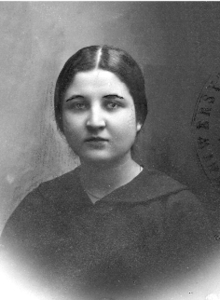Stanisława Nikodym
Stanisława Nikodym (née Liliental; 2 July 1897, Warsaw — 25 March 1988, Warsaw) was a Polish mathematician and artist. She is known for her results in continuum theory, especially on Jordanian continuums.
Stanisława Nikodym | |
|---|---|
 Stanisława Liliental as a student at Warsaw University, 1916 | |
| Born | Stanisława Dorota Liliental July 2, 1897 |
| Died | March 25, 1988 (aged 90) Warsaw |
| Nationality | Polish |
| Citizenship | United States |
| Alma mater | Warsaw University |
| Spouse(s) | Otto M. Nikodym |
| Scientific career | |
| Fields | continuum theory |
| Institutions | Warsaw Polytechnic, Kenyon College |
| Thesis | O rozcinaniu płaszczyźny przez zbiory spójne i kontinua (1925) |
| Doctoral advisor | Stefan Mazurkiewicz |
Life
Stanisława Dorota Liliental was born in Warsaw to Regina Lilientalowa, an ethnographer, and Nathan Liliental. Stanisława had a younger brother, Antoni (born 1908). She attended Helena Skłodowska-Szalay's primary school, and went to Warsaw's private school for women for 7 years. She joined the Warsaw University in 1916, reading mathematics under Stefan Mazurkiewicz, Zygmunt Janiszewski, and Wacław Sierpiński [1]
She married Otto M. Nikodym, a mathematician, in 1924, and joined him at Krakow. Supervised by Mazurkiewicz, she was awarded a doctoral degree from the Jagiellonian University in 1925. She was the first woman in Poland to obtain a PhD in mathematics.[2]
Receiving government funding to study in Paris, she and Otto attended the Sorbonne for two years from 1926. In 1930, they returned to Warsaw. She took up a job at the Warsaw Polytechnic, working with Franciszek Leja till 1936, when he left for Krakow.[3]
Her brother, Antoni, a chemist and officer in the Polish army, was murdered during the Katyn Massacre in 1940.[1] Under the Nazi occupation of Poland, unnecessary occupations, including higher education, were suppressed. The Nikodyms conducted clandestine classes in mathematics despite the danger of punishment.[4] In 1944's Warsaw Uprising, she and her husband lost their possessions, including several unpublished mathematical works. They moved to Belgium for a congress of mathematicians in 1946, and Otto gave lectures in various European cities, before they emigrated to the United States, settling in Gambier, Ohio.[5]
After her husband's death in 1974, she donated their papers and her paintings to the Briscoe Center for American History at the University of Texas, Austin.[6] Stanisława Nikodym died in Warsaw in 1988.[5]
Career
Mathematics
While on leave from university in 1918–1919, Stanisława taught mathematics to soldiers in the Polish army.[2]
Her doctoral thesis was titled On disconnecting the plane by connected sets and continua.[1]
She published three books and several articles before the Second World War broke out.[3]
Among her findings were necessary and sufficient conditions for a subcontinuum of a Jordanian continuum to be Jordanian. She also established that if the intersection and union of two closed sets are Jordanian continua, then so are the sets themselves.[3]
In the 1940s, she taught mathematics at Kenyon College in Gambier, Ohio, where her husband was also a member of the faculty.[7]
Art
As a student, Liliental participated in open-air painting in Sandomierz. She painted the cityscape several times in watercolour over many years in the inter-war period from 1922. The resulting works were presented at an exhibition in 1933, after which she donated them to the District Museum in Sandomierz, where they remain to this day.[8]
Selected works
- Nikodym, Stanisława (1925). "Sur les coupures du plan faites par les ensembles connexes et les continus". Fundamenta Mathematicae. 7. doi:10.4064/fm-7-1-15-23.
- Nikodym, Otto; Nikodym, Stanisława (1936). Wstęp do rachunku rózniczkowego (in Polish). Warsaw: Nasza Księgarnia.
- Nikodym, Stanisława (1948). Wzory i krótkie repetytorium matematyki. Poznan: Księgarnia W. Wilka.
- Nikodym, Otto; Nikodym, Stanisława (1954). "Sur l'extension des corps algébriques abstraits par un procédé généralisé de Cantor". Rendiconti dell'Accademia Nazionale dei Lincei (Classe di Scienze fisiche, matematiche e naturali). 8. 17.
- Nikodym, Otto; Nikodym, Stanisława (1957). "Some theorems on divisibility of infinite cardinals". Archiv der Mathematik. 8. doi:10.1007/BF01900432.
References
- Ciesielska 2018, p. 115.
- Domoradzki & Stawiska 2018, p. 24.
- Ciesielska 2018, p. 116.
- Szymanski 1990, p. 30.
- Ciesielska 2018, p. 117.
- Piotrowski 2014, p. 73.
- Stamp 1995.
- Piotrowski 2014, p. 72.
Bibliography
- Ciesielska, Danuta (2018). "A mathematician and a painter Stanisława Nikodym and her husband Otton Nikodym". In Kjeldsen, T.H.; Oswald, N.; Tobies, R. (eds.). Women in Mathematics: Historical and Modern Perspectives. Mathematisches Forschungsinstitut Oberwolfach. doi:10.4171/OWR/2017/2.CS1 maint: ref=harv (link)
- Domoradzki, Stanisław; Stawiska, Małgorzata (2018). "Polish Mathematics and Mathematicians in World War I". arXiv:1804.02448. Cite journal requires
|journal=(help)CS1 maint: ref=harv (link) - Piotrowski, Walerian (2014). "Jeszcze w sprawie biografii Ottona i Stanisławy Nikodymów". Wiadomości Matematyczne (in Polish). 50 (1).CS1 maint: ref=harv (link)
- Stamp, Tom (1995). "Let Us Now Praise Not-So-Famous Women". Kenyon College Alumni Bulletin (Spring).CS1 maint: ref=harv (link)
- Szymanski, Waclaw (1990). "Who Was Otto Nikodym?". Mathematical Intelligencer. 12 (2).CS1 maint: ref=harv (link)